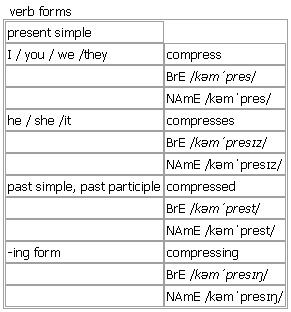|
Từ điển Oxford Advanced Learner 8th
 compress
compress
com·press [compress compresses compressed compressing] verb, noun
verb BrE [kəmˈpres] ; NAmE [kəmˈpres]
1. transitive, intransitive to press or squeeze sth together or into a smaller space; to be pressed or squeezed in this way
•~ sth (into sth) compressed air/gas
•As more snow fell, the bottom layer was compressed into ice.
•She compressed her lips.
•~ (into sth) Her lips compressed into a thin line.
2. transitive ~ sth (into sth) to reduce sth and fit it into a smaller space or amount of time
Syn: ↑condense
•The main arguments were compressed into one chapter.
•Rehearsal time will have to be compressed into two evenings.
3. transitive ~ sth (computing)to make computer files, etc. smaller so that they use less space on a disk, etc.
Opp: ↑decompress
Verb forms: 
Word Origin:
late Middle English: from Old French compresser or late Latin compressare, frequentative of Latin comprimere, from com- ‘together’ + premere ‘to press’; or directly from compress- ‘pressed together’, from the verb comprimere.
Derived Word: ↑compression
noun BrE [ˈkɒmpres] ; NAmE [ˈkɑːmpres]
a cloth that is pressed onto a part of the body to stop the loss of blood, reduce pain, etc
•to apply a cold compress
Word Origin:
late Middle English: from Old French compresser or late Latin compressare, frequentative of Latin comprimere, from com- ‘together’ + premere ‘to press’; or directly from compress- ‘pressed together’, from the verb comprimere.
|
|
|
▼ Từ liên quan / Related words
Related search result for "compress"
|
|
